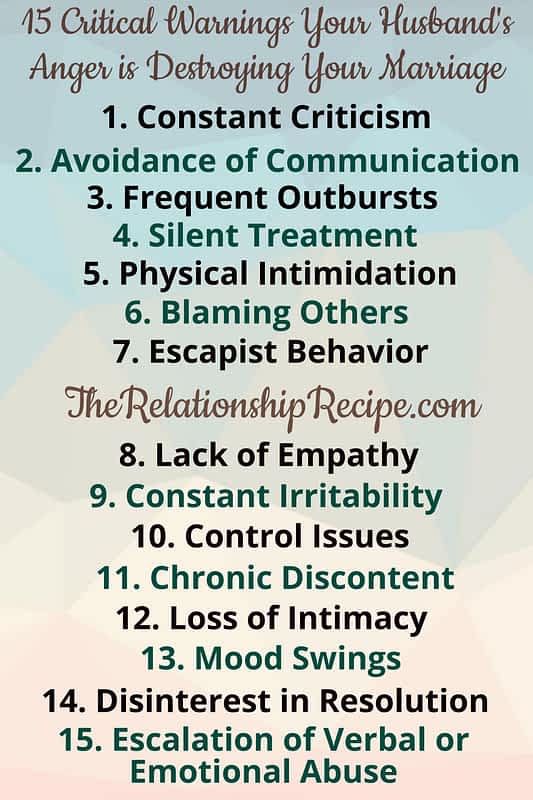Anger in Marriage: 15 Critical Warnings Your Husband’s Rage Is Tearing You Apart
It starts small. A slammed door, a sharp tone, that sinking feeling in your stomach. When anger in marriage becomes a pattern, it stops feeling like a rough patch and starts to feel like walking on eggshells. You’re constantly gauging his mood, watching for changes in voice tone and facial expressions, editing your words, and wondering if it’s you. It’s not just exhausting. It’s lonely… and you’re not nuts for noticing something’s off.
Take it from me – I know. I’ve lived with it for 3 decades. 😱
If you are the one on the receiving end of your husband’s anger and irritation, my heart goes out to you. I have been married to someone like this for nearly 30 years now, and it’s been a major bone of contention between us throughout our entire relationship.
I know of the seething resentment and embarrassment you may have had to endure due to your husband’s emotional weakness and lack of emotional control.
💡Key Highlights
- 💣How anger shows up without saying a word
- 💣Why your gut reaction to his rage matters
- 💣What might really be fueling his temper
- 💣The invisible toll this takes on you
- 💣When it’s no longer “just a bad mood”

It can drain your soul. I’ve had to fill my cup many times after one of his out-of-left-field explosions. 💥
He could literally walk outside for 30 seconds and come back in slamming and banging over something that made him mad. It would send me reeling in amazement at his overreaction to some pretty trivial things.
It has caused me hurt and resentment like I can’t believe at times. I’ve run through all the emotions of sadness, hopelessness and blaming myself for years.
There were times I was angrily “put in my place” out in public. A restaurant once, and even aboard a plane another time, for asking the wrong questions, or asking too many – I don’t know. I don’t beat myself up thinking about it much anymore these days. But I haven’t forgot how it made me feel. Demeaning comes to mind.

His “shock and awe” approach doesn’t work with me anymore. As a result, I have “quiet quit” our marriage as a protection measure for myself. I realized I no longer feel emotionally safe with him, and my body was telling me to go into survival mode after walking on eggshells for so long. My husband doesn’t seem to notice, or care.
Since I work to avoid any conflict when possible, he probably feels like everything is fine. He is clueless about how I feel despite me telling him many times over the years.
I finally gave up.
Mean, then nice, mean then nice, the intermittent reinforcement had me addicted to the highs and lows.

How Angry Husbands Bring Their Wives Shame
When you’re married to an angry man, shame starts to seep into your life in sneaky, quiet ways. You find yourself asking things like, “Did I cause this? Am I overreacting? Would he blow up like this at work, or just with me?” (No, he wouldn’t dare yell at his boss, because there would be consequences.)
💔 At one point, I even asked myself, “How did I end up married to someone with what feels like a full-blown personality disorder?”
Realizing it was a personality issue, and not some failing of mine, was a turning point. I always knew something felt off in the way he handled emotions, but it took me years to stop blaming myself.
💡We’re not responsible for someone else’s rage. We are responsible for how we respond to it, and how much of ourselves we’re willing to lose to keep their peace.
His anger in marriage made a little more sense when I connected it to his childhood. He grew up in chaos, and his mother was controlling and cutting with her words. Fights in his home weren’t just loud, they were violent. Dishes flying across rooms, yelling behind closed doors, tension so thick you could choke on it. He was marinating in dysfunction during the years that shape how a person handles conflict. And now, here he was, recreating it in our home.
The shame and embarrassment caused be his anger felt like it was mine to carry.
It showed up in the quiet covering-up. The fake smiles when company came over. The scrambling to keep the kids calm and the house spotless, hoping he wouldn’t find a reason to explode. I was always trying to stay one step ahead of his next outburst – walking on eggshells, not out of love, but out of fear. Not for my safety exactly, but for my sanity.
That’s what anger in marriage can do. It rewires you. You don’t just fear the outbursts, you fear the embarrassment, the emotional whiplash, the subtle erosion of who you used to be before the yelling became normal.

Peace is Rare When There is Anger in Marriage
Peace is a rare commodity when you are married to a man who is constantly going off about something. Even during the peaceful times, you know in the back of your mind, it’s only temporary, like most things in life.
You may start telling yourself it will happen again, and when it does, it won’t hurt as much because you were ready for it.
When we speak of peace – your husband and marriage should be a soft place to fall when the world outside is anything but peaceful.
While I shouldn’t have done it to begin with – I stopped looking to him for my inner peace years ago when I started noticing patterns. Even when things may have been going along just great, it would never last. As soon as I let my guard down enough to stop the eggshell walk, he’d blow up, starting the whole nasty process over again.
🚩As a protection measure, I started expecting it instead of letting it destroy me each and every time.

15 Warning Signs That Your Husband’s Anger is Ruining your Marriage
- 👉Constant Criticism:
One of the early signs of unaddressed anger in marriage is a tendency to criticize everything. If your husband consistently finds fault in your actions, appearance, or decisions, it may be a manifestation of deeper-seated resentment. - 👉Avoidance of Communication:
When anger in marriage goes unchecked, communication often becomes strained. If your husband avoids discussing important matters or becomes defensive when approached, it could indicate unresolved issues. - 👉Frequent Outbursts:
Uncontrolled outbursts, even over seemingly minor issues, can be a clear warning sign. Explosive reactions are a red flag that deeper issues may be simmering beneath the surface. - 👉Silent Treatment:
Silence can speak volumes. If your husband regularly resorts to the silent treatment instead of engaging in open dialogue, it may signal resentment. - 👉Physical Intimidation:
Any form of physical intimidation, even if it doesn’t escalate to violence, is a serious warning sign. This includes aggressive gestures, smashing objects, or slamming doors during temper tantrums. - 👉Blaming Others:
Those struggling with unresolved anger often deflect blame onto others. If your husband consistently avoids taking responsibility for his actions and points fingers elsewhere, it may be indicative of deep-seated anger. - 👉Escapist Behavior:
Escapist behavior, such as excessive working, substance abuse, or spending long hours away from home, can be a way for men to cope with their issues. Take note if your husband engages in such behaviors. - 👉Lack of Empathy:
Irritability can create a barrier to empathy. If your husband seems indifferent to, or even ignores your feelings, it may be a sign that his anger is clouding his emotional awareness. - 👉Constant Irritability:
A perpetually irritable demeanor can be a subtle sign of ongoing anger. If your husband is easily irritated by trivial matters, it may be an indication that his rage is bubbling beneath the surface. - 👉Control Issues:
Unaddressed rage can manifest as a need for control. If your husband shows controlling behaviors, such as dictating your actions or isolating you from loved ones, it may be a result of unresolved issues. - 👉Chronic Discontent:
A sense of discontentment, regardless of outside circumstances, can indicate deeper emotional turmoil. If your husband is never satisfied or happy, it may be connected to unaddressed anger. - 👉Loss of Intimacy:
Anger can erode emotional and physical intimacy in a marriage. If your husband withdraws emotionally or rejects physical affection, it could be a symptom of unresolved anger. - 👉Mood Swings:
Drastic and unpredictable mood swings can be a manifestation of anger issues that need attention. If your husband’s emotions shift rapidly and without apparent cause, it may be linked to underlying anger problems. - 👉Disinterest in Resolution:
A reluctance for finding solutions, or attend couples therapy can be a sign that your husband is avoiding confronting his anger. A lack of interest in getting to the root causes can perpetuate the destructive cycle. - 👉Escalation of Verbal or Emotional Abuse:
Unaddressed anger can escalate into verbal or emotional abuse. If your husband engages in name-calling, humiliation, or consistently undermines your self-worth, it is a massive warning sign that the anger is reaching a dangerous level.

You Can See the Anger Before You Hear It
Body language says a lot, and when there’s anger in marriage, you usually spot it before a single word is said. Clenched fists, jaw locked tight like he’s grinding his teeth into dust, the deep, rapid breathing… it’s all there. Then comes the puffed-out chest, pacing like a caged animal, and my personal cringe favorite: the flailing arms. (My husband does this, and it was like watching someone lose an argument with invisible air.)
It’s not just uncomfortable. It’s intense. These nonverbal signs can be just as loud as yelling, and sometimes even more intimidating. And when you’re constantly bracing for that dreaded change in his energy: the look, the posture, the tension wears on you. Recognizing these cues isn’t diagnosing him with anything; it’s protecting your peace and knowing when to step back before things escalate.

What’s Really Behind the Anger?
Anger in marriage doesn’t usually show up out of nowhere. It’s often covering something deeper: hurt, fear, frustration, or just feeling totally overwhelmed. Sometimes it’s a learned response from childhood, shaped by how someone grew up or what they saw in their home. Other times, it’s old trauma bubbling up in unhealthy ways.
Can it be inherited? Kind of. People might be born with a quicker temper, but it’s really the mix of personality and environment that shapes how they deal with anger. If your husband lashes out, it could be years of stress, upbringing, or learned behavior – not an excuse, but may be a clue to what’s going on under the surface.

When Mental Health and Anger Collide
Sometimes, anger in marriage isn’t just about a short fuse. It can be tied to deeper mental health struggles like anxiety, depression, or PTSD. If your husband’s anger feels unpredictable or extreme, there may be more going on beneath the surface.
Getting to the root of it matters. Therapy (and sometimes medication) can help manage not just the anger, but what’s really causing it.

Final Thoughts
Recognizing the red flags of anger in marriage isn’t just important, it’s survival. It’s how you start clawing your way out of the shame spiral and back into your own clarity. If your husband’s anger is chipping away at your peace, your confidence, your life.
Encouraging him to get help is brave, but so is protecting your own mental health while he figures that out. Don’t wait until it gets worse. Don’t wait until you’re a shell of yourself. Therapy, support groups, even just talking to someone who gets it; all of that matters.
✨Healing is possible, but it starts with you deciding that the way things are… isn’t how they have to stay.
Before You Go…
I have a book suggestion that I cannot recommend highly enough. “Why Does He Do That? Inside the Mind of Angry and Controlling Men” by Lundy Bancroft. This book should be required reading in high school for all young women. It was such an eye opener to have some affirmation that this is something within them, and no one deserves to be treated like this.
Understanding the rationale behind the abuse, will be so clarifying, and you will have the tools needed to either stay deal with him, or to make the decision to leave.
After reading the book, I admit I was triggered, but what I didn’t know at the time was that it was also a great awakening inside me. I knew his wrath was his problem to solve and that I was not (usually) the underlying reason for it. If your mind, heart and body are screaming inside for some much needed clarity, then you need to read this book.
Out of all the books I’ve read on relationships, this one is at the top of the list and I will be recommending it until my last breath. That is how good it is. Lundy Bancroft has been working with and counseling abusive men for decades and he’s seen and heard it all as these men, during group sessions, opened up and told him exactly what is going through their minds while being abusive towards women. I hope you find it as helpful as do.
FAQ For Anger in Marriage
1. What causes anger in marriage?
Anger in marriage often stems from unresolved conflicts, unmet expectations, stress, or poor communication, which build frustration and lead to frequent emotional outbursts.
2. How can anger damage a marriage?
Unchecked anger erodes trust, intimacy, and communication. It creates emotional distance, fosters resentment, and makes the relationship feel unsafe and unstable.
3. Is anger in marriage normal?
Occasional anger is normal, but persistent, unresolved anger signals deeper issues that need attention to maintain a healthy, respectful partnership.
4. How do I deal with my husband’s anger in marriage?
Set boundaries, communicate calmly, and encourage professional help. If anger becomes abusive, prioritize your safety and seek support immediately.
5. Can anger in marriage be fixed?
Yes, with commitment to open communication, mutual effort, and sometimes counseling, couples can address and overcome anger in their relationship.
6. Why do I feel ashamed of anger in my marriage?
Shame often stems from societal expectations or fear of judgment. It’s important to address these feelings and seek help without guilt.
7. Can anger affect children in a marriage?
Absolutely. Chronic anger in marriage creates a tense environment, impacting children’s emotional well-being and sense of security.
8. How do I know if anger in marriage is a red flag?
If anger causes fear, emotional distress, or persistent conflict, it’s a sign of deeper issues needing immediate attention.
9. Is counseling effective for anger in marriage?
Yes, counseling helps couples understand triggers, improve communication, and develop healthier ways to handle anger together.
10. How do I stop anger from ruining my marriage?
Practice empathy, communicate openly, and address triggers early. Professional support can also help manage anger and restore connection.

This post may contain affiliate links. I earn from qualifying Amazon purchases at no extra cost to you. This content is for informational purposes only and is not a substitute for professional advice. Read full disclaimer.
Thank you for reading this post, don't forget to subscribe!







